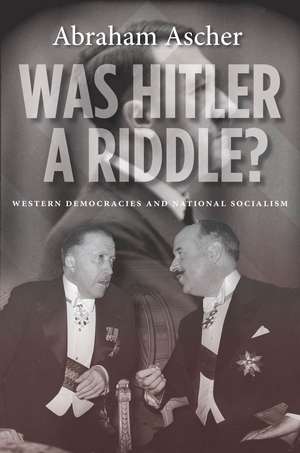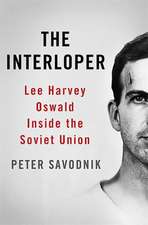Was Hitler a Riddle?: Western Democracies and National Socialism
Autor Abraham Ascheren Limba Engleză Paperback – 20 noi 2012
Was Hitler A Riddle? is the first comparative study of how British, French, and American diplomats serving in Germany assessed Hitler and the Nazi movement. These assessments provided the governments in London, Paris, and Washington with ample information about the ruthlessness of the authorities in Germany and of their determination to conquer vast stretches of Europe. Had the British, French, and American leaders acted on this information and taken measures to rein in Hitler, the history of the twentieth century would have been far less bloody: the second world war might well have been avoided, the Soviet Union would not have expanded into central and eastern Europe, and the world would have been spared the Cold War.
| Toate formatele și edițiile | Preț | Express |
|---|---|---|
| Paperback (1) | 223.09 lei 22-36 zile | |
| Stanford University Press – 20 noi 2012 | 223.09 lei 22-36 zile | |
| Hardback (1) | 774.52 lei 43-57 zile | |
| Stanford University Press – 20 noi 2012 | 774.52 lei 43-57 zile |
Preț: 223.09 lei
Nou
Puncte Express: 335
Preț estimativ în valută:
42.70€ • 46.40$ • 35.89£
42.70€ • 46.40$ • 35.89£
Carte disponibilă
Livrare economică 31 martie-14 aprilie
Preluare comenzi: 021 569.72.76
Specificații
ISBN-13: 9780804783569
ISBN-10: 080478356X
Pagini: 256
Dimensiuni: 152 x 229 x 20 mm
Greutate: 0.34 kg
Editura: Stanford University Press
Colecția Stanford University Press
ISBN-10: 080478356X
Pagini: 256
Dimensiuni: 152 x 229 x 20 mm
Greutate: 0.34 kg
Editura: Stanford University Press
Colecția Stanford University Press
Recenzii
"In its collective approach, Abraham Ascher's Was Hitler a Riddle? is a welcome addition to the substantial literature on individual British, French, and American diplomats working in Hitler's Germany . . . In the end, Asher's thoroughly researched and well-written study indicates without a doubt that Western diplomats reported frequently on Hitler's racial and imperial pretensions."—Eric Kurlander, Journal of Modern History
"[A vast majority] . . . probably assume that the leaders of Great Britain, France, and the United States simply did not know what was happening in the early years of the Third Reich, much less understand it. Abraham Ascher's concise book Was Hitler a Riddle? definitively dispels this explanation. In what can only be described as a model of how properly to write scholarly history aimed at a broader audience, Ascher establishes that western leaders knew a great deal about Adolf Hitler, the Nazi Party's ideology, and the policies of the new regime long before the German invasion of Poland."—Russel Lemmons, History: Reviews of New Books
"In this lively and crispy written account of the reports on National Socialist Germany sent by British, French and American diplomats, Abraham Ascher shows that, with the notable exception of the odious Sir Neville Henderson, they all realized to admittedly varying degrees that the country was not only a military threat, but a challenge to fundamental social, political, and moral values."—Martin Kitchen, Canadian Journal of History
"Ascher takes on in a most intelligent manner an after-the-fact evaluation of Adolf Hitler's decision-making process prior to the outbreak of World War II . . . The quality of the critique and the book's readability warrant its inclusion in an academic collection as well as a synagogue library that serves a highly literate congregation."—Sanford Silverburg, Association of Jewish Libraries
"The book is well written and well documented . . . Recommended."—P. Scherer, CHOICE
"This is a pioneering work of great importance."—Walter Laqueur
"Ascher is succinct, insightful, and convincing."—Evan Bukey, University of Arkansas
"This is a pioneering work of great importance."—Walter Laqueur
"Ascher is succinct, insightful, and convincing."—Evan Bukey, University of Arkansas
Notă biografică
Abraham Ascher is Distinguished Professor Emeritus of History at the Graduate School of the City University of New York. He is the author of numerous works, including, most recently, A Community under Siege: The Jews of Breslau under Nazism (Stanford, 2007).
Descriere
is a comparative study of how British, French, and America diplomats serving in Germany in the 1930s assessed the domestic and foreign policies of the Nazis, in reports that were readily available to government leaders in London, Paris, and Washington.












